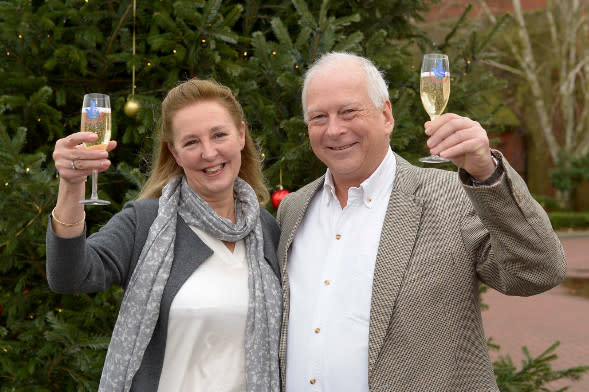Lotto winner hid £1 million from wife

A lottery winner kept his win a secret from his wife for a week, convinced the email telling him he'd won was a scam.
Mike Fiske, 57, was one of ten Mega Friday winners to win £1 million and a trip of a life time to Peru on the EuroMillions Lucky Dip.
But, he says, when he was first told he'd won, he initially assumed he'd won £6.60, as he had before. And when the real amount sank in, he says, he decided it was too good to be true.
"When I finally realised I had won, realising it wasn't a prank or spam email, it felt euphoric," he tells the Mirror.
"I couldn't believe it was real, I just couldn't believe that I had won a million pounds. It isn't something that happens to me, but it has and I have to pinch myself to believe it."
Mike continued to work as normal for a week, before visiting Camelot's offices to confirm the win - and it was only then that he told wife Jane, 58.
"It was wonderful driving home and finally sharing the news with Jane," he says. "As I walked through the door I said to her: 'I've got some good news, we've won £1 million'. She was absolutely bowled over."
Mike is now planning an early retirement from his job as a geophysicist in the oil industry. The couple plan to finish building their new house and spend more time travelling.
Mike's to be forgiven for thinking that his win was a hoax. There are always plenty of email scams doing the rounds, aiming to persuade the unlucky that they're winners - and extract a 'processing' fee before handing over the prize.
Indeed, the Office of Fair Trading (OFT) recently discovered 15 call centres in Canada focused solely on targeting the UK with national lottery scams, one of which conned British victims out of £1,600,000.
"Users who responded to their lottery scam emails saying they are a lottery winner have been asked to send sums such as £7,000 or €5,625 as a "service fee" to receive their 'lotto winnings' or 'euromillions payout'," says Camelot.
"If you pay that money you then receive another lottery scam letter, claiming to be from the Gaming Board of Great Britain, and with a forged signature of a board member, asking for €20,000. Pay that and you get asked for a courier fee to send your winning cheque. Pay that and... well, you get the idea."
Such emails often look extremely convincing, complete with official details and logos. The key to detecting a fraud is usually to check where the email's coming from: Camelot and other reputable organisations don't use free Webmail-based email accounts such as Yahoo or Hotmail.
And friends can often carry out hoaxes too - indeed, fake lottery scratchcards, all with winning numbers, are widely available online for just a couple of quid a packet. And many people have used video recorders to good effect, buying a ticket with last week's winning numbers and presenting a recording of the show as live.
Read more on AOL Money:
Lee Ryan: Lottery winner lost it all
The most memorable lotto winners
Five lottery winners who blew the lot





